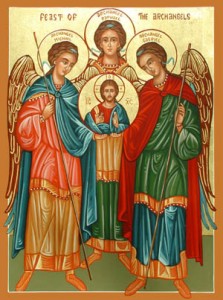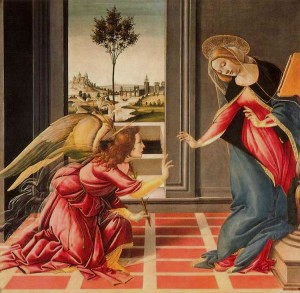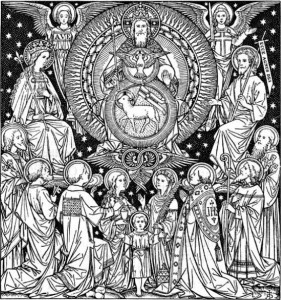====================
This sermon was preached on St. Michael and All Angels Day, September 29, 2013, at St. Paul’s Episcopal Church, Medina, Ohio, where Fr. Funston is rector.
(The Episcopal Lectionary, Michaelmas: Genesis 28:10-17; Revelation 12:7-12; Psalm 103; and John 1:47-51. These lessons can be read at The Lectionary Page.)
====================
 We are stepping out of the “common of time,” away from the progression of lessons assigned for the Sundays of Ordinary Time, and instead celebrating the Feast of Michaelmas, known variously as the Feast of Saint Michael the Archangel or as the Feast of Saints Michael, Gabriel, Uriel, and Raphael, or as the Feast of the Archangels, or as the Feast of Saint Michael and All Angels (the latter being the preferred Anglican name for this commemoration). The only reason we are doing so is a personal conceit of your rector; Michaelmas, the 29th of September, just happens to be my birthday. Today I am celebrating the 30th anniversary of my twenty-eleventh birthday. I’ll get back to that in a moment, but first . . . a word about Michaelmas.
We are stepping out of the “common of time,” away from the progression of lessons assigned for the Sundays of Ordinary Time, and instead celebrating the Feast of Michaelmas, known variously as the Feast of Saint Michael the Archangel or as the Feast of Saints Michael, Gabriel, Uriel, and Raphael, or as the Feast of the Archangels, or as the Feast of Saint Michael and All Angels (the latter being the preferred Anglican name for this commemoration). The only reason we are doing so is a personal conceit of your rector; Michaelmas, the 29th of September, just happens to be my birthday. Today I am celebrating the 30th anniversary of my twenty-eleventh birthday. I’ll get back to that in a moment, but first . . . a word about Michaelmas.
It shouldn’t surprise any of us that on, St. Michael and All Angels Day, we are treated to three very familiar stories of angels in Holy Scripture: first, the story of “Jacob’s ladder;” second, the story of the war in heaven in which Michael, leading the “good” angels, beats “the dragon” (named “the Devil or Satan”) and his “bad” angels; and finally, the gospel story of Jesus telling Nathanael that he will see something like Jacob’s ladder, “ascending and descending upon the Son of Man.”
We know what angels are, or at least we think we do. They are a separate order of creation, beings of spiritual energy who interact with human beings as the servants and often as the messengers of God. The English word angel derives from the Latin angelus which in turn is the romanization of the ancient ángelos which means “messenger” or “envoy.” In the Hebrew of the Old Testament, we find the terms mal’ak elohim (“messenger of God”), mal’ak YHWH (“messenger of the Lord”), bene elohim (“sons of God”) and haqqodesim (“holy ones”) translated into English as angels. The first of these, mal’ak elohim, is what we find in today’s Genesis passage. In addition, there are specific kinds of angels identified in the Hebrew Scriptures. There are the Cherubim – one of whom is placed with a flaming sword to guard the gateway to the Garden of Eden in Genesis 3 and who are said to flank or support God’s throne as, for example, in Hezekiah’s prayer in the book of the Prophet Isaiah (ch. 37); the Cherubs are apparently not cute, little, chubby baby angels! And there are the Seraphim – whom Isaiah describes as having “six wings: with two they covered their faces, and with two they covered their feet, and with two they flew,” and who sing God’s praises in the heavenly throne room.
We know the personal names of some of the angels, particularly the archangels – Gabriel, who is named in the Book of Daniel and identified in the Gospel of Luke as the angel of the Annunciation; Raphael, who is identified as a companion and advisor to Tobias in the apocryphal Book of Tobit; Uriel, who was sent to test the prophet Ezra according to the apocryphal Second Book of Esdras; and Michael, who is the leader of God’s angel army in the story of Revelation today.
We know that human beings, when they die, do not become angels . . . although lots of people say things like that in order to comfort the bereaved who have lost loved ones. Angels, as I said, are a separate order of creation, beings of immense spiritual energy. If the Book of Job is correct, they were created before the physical world: in questioning Job, God asks him if he was there when the foundations of the earth were put in place, “when the morning stars sang together and all the heavenly beings shouted for joy?” (38:7; the term here is bene elohim, sons of God.)
So . . . we know a lot about angels, but why do we venerate them on this particular day? And what can we learn from them? The first question is easy to answer: the date commemorates the dedication of the Sanctuary of St. Michael Archangel built on Monte Gargano in Italy in 493 a.d. in honor of an apparition of the archangel a few years before. The second question is not so easy.
What I think we learn from angels is conscience. Whenever I hear the word “angels,” to be very honest, my first thought is not of their religious history or meaning, but of the conclusion of Abraham Lincoln’s first inaugural address given on March 4, 1861, just two weeks after Jefferson Davis had been inaugurated as president of the Confederacy. Referring to that secession and the potential of war to preserve the Union, finished his speech saying:
We are not enemies, but friends. We must not be enemies. Though passion may have strained it must not break our bonds of affection. The mystic chords of memory, stretching from every battlefield and patriot grave to every living heart and hearthstone all over this broad land, will yet swell the chorus of the Union, when again touched, as surely they will be, by the better angels of our nature.
I love that turn of phrase, “the better angels of our nature.” I’m not the least bit sure what Mr. Lincoln meant by the phrase, but it has always appealed to me. A few years ago, a Harvard psychologist named Steven Pinker used it as the title of a book in which he named four of these “better angels:”
- Empathy, which “prompts us to feel the pain of others and to align their interests with our own”
- Self-control, which “allows us to anticipate the consequences of acting on our impulses” and thus to regulate those impulses
- Moral sense, which “sanctifies a set of norms and taboos that govern the interactions among people”
- Reason, which “allows us to extract ourselves from our parochial vantage points.”
These are all, to my way of thinking, gifts of God. In a sense, they are a modern rendition of what St. Paul called the “fruit of the Spirit,” although Paul listed nine attributes: love, joy, peace, forbearance, kindness, goodness, faithfulness, gentleness and self-control. (Galatians 5:22-23) Or of those gifts of the Holy Spirit listed by Isaiah: wisdom, understanding, counsel, fortitude, knowledge, piety, and fear of the Lord. It is through these fruits and gifts that human conscience is informed and moral judgment enlightened, and conscience, as Thomas Merton said, “is the light by which we interpret the will of God in our own lives.” (No Man Is an Island)
Some of you may be familiar with the Henry Fonda film from the 1940s entitled The Ox-Bow Incident. It’s based on a novel of the same name by the Nevada writer Walter Van Tilburg Clark. In the story, the narrator Art Croft is one of two men who drift into a Nevada ranching town and end up becoming part of a posse that turns into a lynch mob. They end up hanging, without a trial, three men who may or may not actually be guilty of the crimes they are accused of — cattle rustling and murder. Reflecting on what has happened, Art Croft asks, “If we can touch God at all, where do we touch him save in the conscience?” If the angels are the messengers of God, perhaps our conscience is the means through which the “better angels of our nature” communicate God’s will to us. As Theologian Peter Kreeft explains, the conscience as “the voice of God in the soul.”
Along those lines, in a Michaelmas sermon preached a few years ago, the Very Rev. John Hall, Dean of Westminster Abbey, said this:
We can and should then think of God speaking directly to us, out of his love and care for us as individuals. However we must understand God’s presence with us as a reality inseparable from that of God’s presence among us. Through our fellowship in the Church, Christ’s Body, God informs our conscience through his Word and feeds our soul through the sacraments, drawing us together as Christians into unity with each other and with himself. If we try to go it alone as Christians, we run great risks of going astray. The Church understands the work and role of the angels as assisting in mediating the presence of God with us and amongst us. (29 September 2010)
I don’t think I can learn much from angels as mighty beings standing guard at the entrance to Eden, or as warriors fighting Satan and casting him out of heaven, or as singers in the heavenly choir, or as the pillars and supports of God’s throne. But as the prompters and prickers of my conscience, as the “better angels” of empathy, moral sense, self-control, and reason, as the communicators of the gifts and fruits of the Spirit, as mediators of God’s presence in the Church, I can learn a great deal from them.
The Psalmist, in our gradual this morning, declared that God’s righteousness and merciful goodness endure forever “on those who keep his covenant and remember his commandments and do them.” It is these “better angels” who keep that memory alive in our consciences and to them, and to the God whose presence they mediate within us individually and among us corporately, we can turn for answers to life’s challenges.
So . . . as I said, it’s my birthday. Today, and for the next decade or so, when asked how old I am, I can answer, “Sixty-something.” (A graphic I posted today on my Facebook page says, “I’m not sixty-something. I’m $59.95 plus shipping and handling.”) In any event, a birthday is a time of taking stock, or considering one’s past, one’s actions, the answers one has developed in one’s life, and one’s future.
I mentioned in a conversation with some parishioners last week that when I’d been ten years at St. Francis Parish in Stilwell, Kansas, my congregation last before this one, Evelyn and I came to the conclusion that it was time to leave. One of the people I was talking with asked, “You’ve been here at St. Paul’s for ten years. Is it time to leave?” That’s a birthday sort of question. It’s what might be called “a big question.”
The past six decades, like everyone’s life, has been full of big questions of that sort, to be honest. Whether to study law? Whether to get married? Whether to leave the practice of law? Whether to become a priest? Move to Kansas? Leave Kansas? Accept nomination in an episcopal election? Those are big questions. But sometimes our replies to big questions are little answers, puny responses that put off meeting the real challenges.
A friend recently shared a poem with me, a poem by Dame Edith Louisa Sitwell. I wasn’t familiar with Sitwell so I did some research on her. She was the eldest child of the 4th Baronet of Renishaw Hall, born in 1887. In her twenties, she began publishing poems in the Daily Mirror newspaper. She was six feet tall and habitually wore brocade gowns, gold turbans, and (one biographer said) “a plethora of rings.” Apparently she was given to public feuds with other literary figures. One critic said of her that “wore other people’s bleeding hearts on her own safe sleeve,” and another called her “an eccentric matriarch with a slender grip on reality.” Just my sort of poet! No wonder I liked what she had to say about our responses to life’s questions in a short poem entitled Answers:
I kept my answers small and kept them near;
Big questions bruised my mind but still I let
Small answers be a bulwark to my fear.
The huge abstractions I kept from the light;
Small things I handled and caressed and loved.
I let the stars assume the whole of night.
But the big answers clamoured to be moved
Into my life. Their great audacity
Shouted to be acknowledged and believed.
Even when all small answers build up to
Protection of my spirit, still I hear
Big answers striving for their overthrow.
And all the great conclusions coming near.
I believe the “great conclusions coming near,” the big answers clamoring, the huge abstractions shouting to be acknowledged, are the angels calling each of us to greater ministries, the messengers of God urging us to a more audacious Christian presence in the world.
In a couple of months’ time, our construction project will be done. We’ll have a great new gallery, an expanded parish hall, a great new face presented to the community. When we broke ground here in July, the Old Testament lesson was the same reading from Genesis we hear this morning. I suggested then that this place, this St. Paul’s Episcopal Church located at 317 East Liberty Street in Medina, Ohio, is like Jacob’s Bethel.
It is an awesome place. It is a house of God. It is a gate of heaven. But just like Jacob’s Bethel, it is a place we are bidden to leave; it is a place from which the angels of God bid us go. A church building is meant to be the base from which the people of God go into the world. A church building is meant to be a place of life, a center of ministry, a place of assembly, where God’s people gather to worship, to hear the message of the angels, to celebrate the meaning of life, and to be transformed, and then “burst forth,” back out into the world to share the Good News with, and transform the lives of, others. The angels of God call us individually and corporately to greater ministries, to a more audacious Christian presence in our world.
The answer to that “big question” I was asked is, “No, it’s not time for me to leave St. Paul’s.” But it is time for all of us as St. Paul’s to leave this place, to go out from this new building we are creating, to “burst forth” into the world like Jacob and his offspring, to be “angels,” messengers of God, telling the world the Good News of God in Christ.
Amen.
====================
A request to my readers: I’m trying to build the readership of this blog and I’d very much appreciate your help in doing so. If you find something here that is of value, please share it with others. If you are on Facebook, “like” the posts on your page so others can see them. If you are following me on Twitter, please “retweet” the notices of these meditations. If you have a blog of your own, please include mine in your links (a favor I will gladly reciprocate). Many thanks!
====================
Father Funston is the rector of St. Paul’s Episcopal Church, Medina, Ohio.
 First, a confession: I’m not fond of the Book of Revelation. Although it has occasionally brilliant passages and some incredible metaphoric imagery, it is probably the most abused and misused piece of scripture in the entire Christian canon! I remember hearing or reading at one time that, during the formation of the canon, bishops in what is now the Eastern Orthodox wing of the church opposed the inclusion of this book. If that had been the way things went, it would have been relegated to that collection of interesting historical literature which includes The Shepherd of Hermas, The Didiche, and the Letters of Clement. But it wasn’t, so we have it and we have to take it seriously. (When dealing with the Apocalypse, it is well to remember the meme about Episcopalians, though: “We take the Bible too seriously to take it literally!”)
First, a confession: I’m not fond of the Book of Revelation. Although it has occasionally brilliant passages and some incredible metaphoric imagery, it is probably the most abused and misused piece of scripture in the entire Christian canon! I remember hearing or reading at one time that, during the formation of the canon, bishops in what is now the Eastern Orthodox wing of the church opposed the inclusion of this book. If that had been the way things went, it would have been relegated to that collection of interesting historical literature which includes The Shepherd of Hermas, The Didiche, and the Letters of Clement. But it wasn’t, so we have it and we have to take it seriously. (When dealing with the Apocalypse, it is well to remember the meme about Episcopalians, though: “We take the Bible too seriously to take it literally!”) Today is the 50th anniversary of the assassination of President John F. Kennedy. Like everyone who was even marginally grown up or conscious on that day, I know exactly where I was and what I was doing when it happened. It is one of those moments in time that are surreal in their clarity.
Today is the 50th anniversary of the assassination of President John F. Kennedy. Like everyone who was even marginally grown up or conscious on that day, I know exactly where I was and what I was doing when it happened. It is one of those moments in time that are surreal in their clarity.  I’m following a thread on a friend’s Facebook page about the future of the “institutional church,” by which I think the various participants mean their several denominations. (We are Episcopalians, Methodists, Presbyterians, Lutherans, etc., all of whom seem primarily to identify as Christians and only secondarily with the variety of polities, theologies, liturgical styles, and so forth we each prefer.) I suggested in the discussion that creating institutions is in the very nature of human beings; we create them, criticize them, tear them down, reform them, and recreate them, but we never escape from them. Another participant in response said, “I do not create community.”
I’m following a thread on a friend’s Facebook page about the future of the “institutional church,” by which I think the various participants mean their several denominations. (We are Episcopalians, Methodists, Presbyterians, Lutherans, etc., all of whom seem primarily to identify as Christians and only secondarily with the variety of polities, theologies, liturgical styles, and so forth we each prefer.) I suggested in the discussion that creating institutions is in the very nature of human beings; we create them, criticize them, tear them down, reform them, and recreate them, but we never escape from them. Another participant in response said, “I do not create community.” We are stepping out of the “common of time,” away from the progression of lessons assigned for the Sundays of Ordinary Time, and instead celebrating the Feast of Michaelmas, known variously as the Feast of Saint Michael the Archangel or as the Feast of Saints Michael, Gabriel, Uriel, and Raphael, or as the Feast of the Archangels, or as the Feast of Saint Michael and All Angels (the latter being the preferred Anglican name for this commemoration). The only reason we are doing so is a personal conceit of your rector; Michaelmas, the 29th of September, just happens to be my birthday. Today I am celebrating the 30th anniversary of my twenty-eleventh birthday. I’ll get back to that in a moment, but first . . . a word about Michaelmas.
We are stepping out of the “common of time,” away from the progression of lessons assigned for the Sundays of Ordinary Time, and instead celebrating the Feast of Michaelmas, known variously as the Feast of Saint Michael the Archangel or as the Feast of Saints Michael, Gabriel, Uriel, and Raphael, or as the Feast of the Archangels, or as the Feast of Saint Michael and All Angels (the latter being the preferred Anglican name for this commemoration). The only reason we are doing so is a personal conceit of your rector; Michaelmas, the 29th of September, just happens to be my birthday. Today I am celebrating the 30th anniversary of my twenty-eleventh birthday. I’ll get back to that in a moment, but first . . . a word about Michaelmas. Are you familiar with those visions of the afterlife in which the dearly departed, clothed in flowing white robes lounge around on fluffy, white cotton clouds playing harps? I have to be honest with you that I cherish a very dear hope that such visions are 100% absolutely wrong! I cannot imagine any existence more boring than an eternity of cloud-floating and harp-playing, and if my ten years of knowing Charlie Stehno have given me a clue of anything about Charlie it is that he would most likely feel the same way. If he has gotten to the Great Hereafter only to find himself fitted out with a flowing white robe and issued a harp to play and cloud to lounge upon, I suspect that he is (as my grandmother would say) “fit to be tied.”
Are you familiar with those visions of the afterlife in which the dearly departed, clothed in flowing white robes lounge around on fluffy, white cotton clouds playing harps? I have to be honest with you that I cherish a very dear hope that such visions are 100% absolutely wrong! I cannot imagine any existence more boring than an eternity of cloud-floating and harp-playing, and if my ten years of knowing Charlie Stehno have given me a clue of anything about Charlie it is that he would most likely feel the same way. If he has gotten to the Great Hereafter only to find himself fitted out with a flowing white robe and issued a harp to play and cloud to lounge upon, I suspect that he is (as my grandmother would say) “fit to be tied.” It’s Good Shepherd Sunday . . . the Fourth Sunday of the Easter Season is always Good Shepherd Sunday. Every year, regardless of which of the three years of the Lectionary cycle we are in, we hear some lessons which mention shepherds or lambs, and we recite the 23rd Psalm as the Gradual, and we sing every “Shepherd hymn” in the hymnal. I’ve been preaching Good Shepherd sermons for 25 years, so I pretty much thought this was going to be one of those Sundays when I could just “wing it” and preach extemporaneously.
It’s Good Shepherd Sunday . . . the Fourth Sunday of the Easter Season is always Good Shepherd Sunday. Every year, regardless of which of the three years of the Lectionary cycle we are in, we hear some lessons which mention shepherds or lambs, and we recite the 23rd Psalm as the Gradual, and we sing every “Shepherd hymn” in the hymnal. I’ve been preaching Good Shepherd sermons for 25 years, so I pretty much thought this was going to be one of those Sundays when I could just “wing it” and preach extemporaneously.  Several years ago, shortly after my mother died, my step-dad’s business partner also passed away leaving my step-dad to run the business they had created together. Now it is no insult to my step-dad, Stan, who had never before been a business owner, to say that he knew little or nothing about running a business. He’d been a tool-and-die man most of his working life with a brief foray into sales, but he’d never been in the “front office” and he’d certainly never been a manager or executive of any sort. Stan didn’t know accounts receivable from fish, and inventory control was a foreign language to him.
Several years ago, shortly after my mother died, my step-dad’s business partner also passed away leaving my step-dad to run the business they had created together. Now it is no insult to my step-dad, Stan, who had never before been a business owner, to say that he knew little or nothing about running a business. He’d been a tool-and-die man most of his working life with a brief foray into sales, but he’d never been in the “front office” and he’d certainly never been a manager or executive of any sort. Stan didn’t know accounts receivable from fish, and inventory control was a foreign language to him. Leslie Dixon Weatherhead (1893-1976) was an English Methodist Minister who served at the City Temple, a Congregational Church in London. He served there from 1936 until his retirement in 1960. In one of his several book, The Christian Agnostic, he wrote, “When people said to me, ‘I should like to be a member of the City Temple, what must I believe?’ I used to say, ‘Only those things which appear to you to be true.’”
Leslie Dixon Weatherhead (1893-1976) was an English Methodist Minister who served at the City Temple, a Congregational Church in London. He served there from 1936 until his retirement in 1960. In one of his several book, The Christian Agnostic, he wrote, “When people said to me, ‘I should like to be a member of the City Temple, what must I believe?’ I used to say, ‘Only those things which appear to you to be true.’” Well! Here we are . . . just a few days ago I mentioned this text in regard to another lectionary reading. I am attending a conference on “emerging Christianity” this week and this text (having come up in that meditation) has been on my mind. There are many among the participants in this conversation who are quite passionate about the “emerging church” movement; they are definitely not “lukewarm”.
Well! Here we are . . . just a few days ago I mentioned this text in regard to another lectionary reading. I am attending a conference on “emerging Christianity” this week and this text (having come up in that meditation) has been on my mind. There are many among the participants in this conversation who are quite passionate about the “emerging church” movement; they are definitely not “lukewarm”. “I was ready to be sought . . . I said, ‘Here I am, here I am’.” Almost more than anything else in Scripture, these words speak to me of God as not just wanting but needing to be in relationship with creation. I have written elsewhere about my understanding of God as the God who communicates; here is the God who seems almost desperate to be in relationship with his people. God speaks and everything comes in to being; in the beginning was the Word. But what good is speaking, what good is a word, if no one hears it, no one answers it? “Here I am, here I am” seems like a plea to be heard, to be recognized, to be answered. But in our modern society, very few people seem to be answering. Many claim to be seeking, many claim to be “spiritual but not religious,” but few are finding God in the traditional faiths and faith communities.
“I was ready to be sought . . . I said, ‘Here I am, here I am’.” Almost more than anything else in Scripture, these words speak to me of God as not just wanting but needing to be in relationship with creation. I have written elsewhere about my understanding of God as the God who communicates; here is the God who seems almost desperate to be in relationship with his people. God speaks and everything comes in to being; in the beginning was the Word. But what good is speaking, what good is a word, if no one hears it, no one answers it? “Here I am, here I am” seems like a plea to be heard, to be recognized, to be answered. But in our modern society, very few people seem to be answering. Many claim to be seeking, many claim to be “spiritual but not religious,” but few are finding God in the traditional faiths and faith communities.

